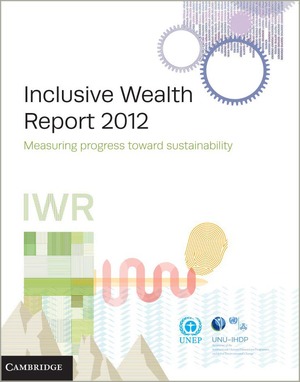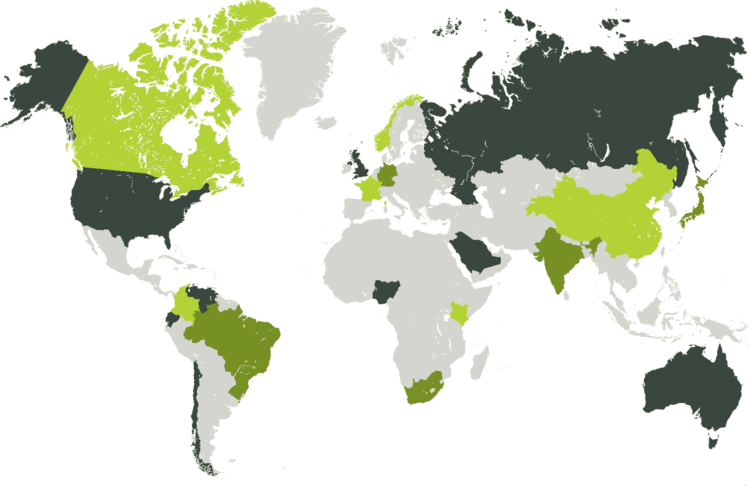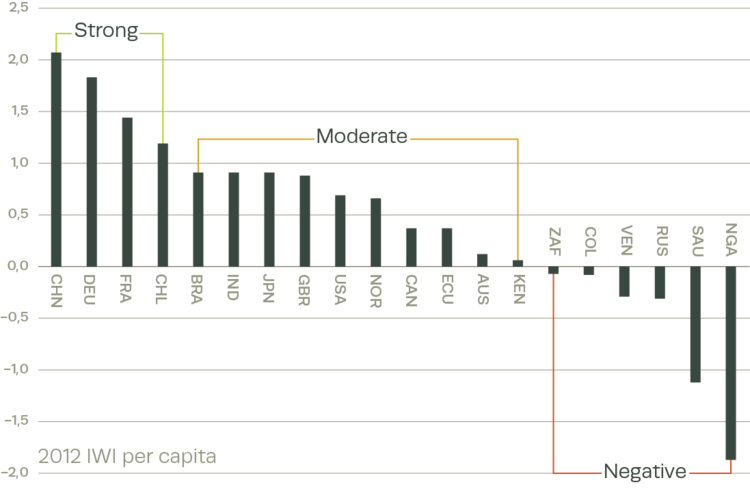
|
 |
 |
 |
 |

ABOUT THE REPORT
The indicators used in the past to measure human societies' success have proven to be insufficient. Economic production indicators such as gross domestic product (GDP) and the Human Development Index (HDI) fail to reflect the state of natural resources or ecological conditions and both focus exclusively on the short term, without indicating whether national policies are sustainable over longer periods of time.

 FREE DOWNLOAD
FREE DOWNLOAD
The Inclusive Wealth Report 2012 presents an index that measures the wealth of nations by carrying out a comprehensive analysis of a country's capital assets, including manufactured capital, such as roads and factories; human capital, including education, knowledge and creativity; and natural capital, forests and minerals; and their respective values: the Inclusive Wealth Index (IWI).
The preliminary IWR gives an overview on the evolution of some relevant categories of natural capital in a range of countries over a 19-year period. The report compares the decline or increase of natural capital against two other areas: produced capital and human capital. Results indicate that it is possible to trace the changes of the components of wealth by country and link these to economic growth. This highlights the impact of declines or increases in natural capital as an economic productive base.
Results show changes in inclusive wealth from 1990 to 2008 and a comparison to GDP for a group of 20 countries. This report provides policy-makers and planning authorities with a tool to assess the state of a country's productive base and its development over time. 
|
 |
 |
 |
 |
 |

20 COUNTRIES



Australia,
Brazil,
Canada,
Chile,
China,
Colombia,
Ecuador,
France,
Germany,
India,
Japan,
Kenya,
Nigeria,
Norway,
Russia,
Saudi Arabia,
South Africa,
United Kingdom,
United States,
Venezuela 
|
 |
 |
 |

FINDING 1
70% of countries included present a positive IWI, and are developing sustainably



(2012 Per-Capita IWI)
FINDING 2
High population growth caused 25% to become unsustainable
FINDING 3
19 of 20 countries had a decline in natural capital
FINDING 4
Human capital increased in every country assessed
FINDING 5
GDP has given a false positive in 25% of countries assessed 
|
 |
 |
 |
 |
 |
 |
 |
 |
 |

AUTHORS

The group of authors for this first Inclusive Wealth Report was selected based on their expertise in inclusive wealth and environmental economics. Each has an extensive publication record in the area of natural capital, human well-being, social welfare, and valuation, among others.

Partha Dasgupta
Science Advisor, University of Cambridge

Anantha Kumar Duraiappah
Report Director, International Human Dimensions Programme on Global Environmental Change

Pablo Muñoz
Science Director, International Human Dimensions Programme on Global Environmental Change

Matthew Agarwala
London School of Economics and Political Science

Giles Atkinson
London School of Economics and Political Science, Centre for Climate Change Economics and Policy

Edward B. Barbier
University of Wyoming

Elorm Darkey
University of Bonn

Paul Ekins
University College London

Pablo Fuentenebro
IHDP Secretariat

Juan Sebastian Lozano
The Nature Conservancy (Colombia)

Kevin J. Mumford
Purdue University

Kirsten Oleson
University of Hawaii

Leonie Pearson
University of Melbourne

Charles Perrings
Arizona State University

Chris Perry
UN-Water Decade Programme on Capacity Development (UNW-DPC)

Stephen Polasky
University of Minnesota

Heather Tallis
Stanford University

Stacie Wolny
Stanford University 
|
 |
 |
 |
 |
 |

REVIEWERS

Each chapter of the report was reviewed by a minimum of two external referees, who are each experts in their field with strong academic credentials, and a good publishing record.

John Agnew,
Peter Bartelmus,
Julia Bucknall,
Dabo Guan,
Michael Harris,
Rashid Hassan,
Nicolas Kosoy,
Jens Liebe,
Hal Mooney,
Eric Neumayer,
Timothée Ollivier,
Unai Pascual,
Alan Randall,
Bart Schultz,
Stanislav Shmelev,
R. Kerry Turner,
Jeff Vincent,
Aart de Zeeuw 
|
 |
|

